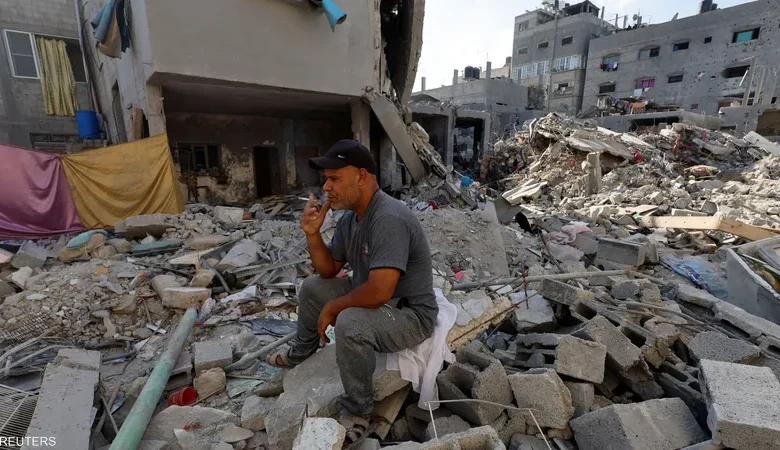The United Nations describes Gaza as an uninhabitable area
Settlers in the West Bank exploit the war in Gaza to build informal settlements and new roads

The United Nations has warned that the besieged Gaza has become a place of death and is unsuitable for habitation, while Israel continued new strikes on the southern part of the sector on Saturday, amid ongoing violations by settlers in the West Bank exploiting the state of war.
Journalists reported that Israeli strikes targeted the city of Rafah in the southern part of Gaza early Saturday, where hundreds of thousands of Palestinians have sought refuge in recent weeks, trying to escape the clashes.
On Friday, Palestinian medical sources reported 35 fatalities in Deir al-Balah in the central Gaza Strip. In northern Gaza, where the Israeli army launched its ground operation at the end of October, shelling operations continue.
A resident of Jabalia (north) said on Friday after an Israeli airstrike, “The entire neighborhood is destroyed, and I don’t know where people will return. Where will we live?” He added, “Look at this destruction. But despite that, we will remain determined. We didn’t flee to the south or elsewhere.
We stayed on track (Jabalia), where our homes were.” The United Nations’ Coordinator for Humanitarian Affairs, Martin Griffiths, warned that the besieged Palestinian territory has become “simply unfit for habitation.”
He said in a statement, “Three months after the horrific attacks on October 7th, Gaza has become a place of death and despair,” and “its inhabitants face daily threats in full view of the world.”
UNICEF reports that the confrontations, malnutrition, and health conditions have created a “cycle of death threatening over 1.1 million children” in this region that was poverty-stricken even before the war began.
Israel pledged to “eliminate” Hamas after the unprecedented attack launched by the movement on the southern part of the Israeli state on October 7th. The attack resulted in the deaths of around 1,140 people, mostly civilians, according to a count based on official Israeli figures.
About 250 people were abducted and held hostage, with 132 of them still inside the sector. Israeli airstrikes on the sector, accompanied by a ground attack starting on October 27th, led to the deaths of 22,600 people, most of them women and children, according to the Ministry of Health affiliated with Hamas.
Griffiths affirmed, “We continue to call for an immediate end to the conflict, not only for the sake of the threatened residents of Gaza and its neighbors but for the coming generations that will never forget ninety days of hell and attacks on basic humanitarian principles.”
However, Israel insists that its operation in Gaza will continue until the “return” of the hostages and the “elimination” of Hamas‘s military capabilities, which the United States still considers “significant.”
Israeli army spokesperson Daniel Haggai warned that “2024 will be a year of fighting,” also noting a “very high level of readiness” for forces at the borders with Lebanon, which have been the scene of daily shelling exchanges with Hezbollah since October 8th. Concerns have increased about the widening of the conflict.
The deputy head of Hamas‘s political office, Saleh al-Arouri, was killed by a strike in the southern suburbs of Beirut on Tuesday, an act blamed on Hamas, Hezbollah, and Lebanese authorities accusing Israel of carrying it out. Hezbollah‘s Secretary-General Hassan Nasrallah renewed on Friday the affirmation that a response to al-Arouri’s assassination is “inevitable,” and that the party’s fighters “on the border” will be the ones to respond.
The Houthi rebels, backed by Iran in Yemen, have intensified their attacks on merchant ships in the Red Sea, while other groups in Iraq and Syria target U.S. forces stationed in both countries using missiles and drones.
In this context, the EU’s High Representative for Foreign Affairs, Josep Borrell, is expected to hold talks with officials in Lebanon at the end of this week, while U.S. Secretary of State Antony Blinken visits Turkey as part of a regional tour that includes Israel, the occupied West Bank, and five Arab countries: Egypt, Jordan, Qatar, Saudi Arabia, and the UAE. Blinken will discuss “preventing the expansion of the conflict,” according to a State Department spokesperson. Another potential agenda item is the long-term future of Gaza.
French Foreign Minister Jean-Yves Le Drian said in a statement to CNN on Friday that “Gaza is Palestinian land that will be part of the Palestinian state in the future. Israel cannot decide Gaza’s future.”
Ziad Abdo (60 years old), a Palestinian who fled the fighting to Rafah, said, “The future will be mainly about reconstruction. Look at the destroyed hospitals and schools. Nothing is left.” However, for the Israeli ministers belonging to the far-right, Itamar Ben Gvir and Bezalel Smotrich, the future of Gaza lies in the departure of Palestinians and the return of Jewish settlers.
The non-governmental Israeli organization “Peace Now” reported in a new study that the number of informal settlements and new roads built for settlers in the West Bank has increased “unprecedentedly” since the beginning of the war in Gaza.
According to this organization, nine “settlement outposts” have been established in the West Bank since the outbreak of the war between Israel and Hamas.












